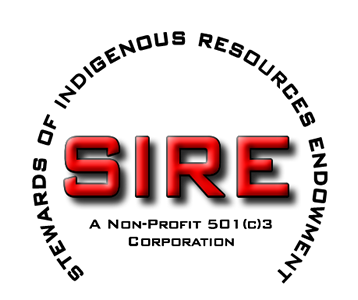








I am Roberta Armstrong, Founder and Executive Director of Stewards of Indigenous Resources Endowment (“SIRE”). SIRE is a non-profit professional service corporation that I created in 2007 to help a Nation of people who were the catalyst in giving meaning and passion to my legal career. After reading my web page which further explains the direction and intentions I have for the corporation, I encourage you to become part of SIRE and make it your company, too.
Prior to my summer 2007 internship with the Institute of Indian Estate Planning and Probate (“Institute”), I had not taken any type of Indian Law course other than recalling the famous case of Johnson v. M’Intosh 21 U.S. (8 Wheat.) 543 (1823) from my first year property law class. Despite limited education and training in Indian Law, I had become aware of the injustices incurred by US Government’s outlandish treatment of Indians reasoned and delivered by Chief Justice John Marshall. Being of black ancestry, I internalized the plight of the Indian on a personal level, i.e., governmental initiatives such as AIPRA having devastating effects on individuals, family, community, and subsequently their Nation. It motivated a passion within to help the Indians of the Confederated Tribes of the Warm Springs Reservation of Oregon protect their property rights.
I was both excited and anxious about this internship because it was my first actual legal job. The most attractive aspect of the experience was living on the reservation. Although well traveled, I had never before lived abroad for any extended period of time. Living on the reservation was essentially like living in a different country although still within the United States. It was made clear ahead of time that I would be governed according to the Nation’s rules and regulations. Most surprising, though, was that I could not be charged with a criminal charge. Naturally, I had no intention of committing a crime, but it was unnerving that I could live on their land, commit a crime, and the Tribe could do nothing about it without the authority of the Bureau of Indian Affairs (“BIA”) – simply because the US Government had not granted Indian Nations the authority to charge non-Indians with criminal offenses. The fallout of such laws is non-Indians committing criminal activities such as setting up meth labs, destroying natural habitat, domestic violence or rape of Indian women by their non-Indian spouse or partner, and the offenders remain exempt!
 There were stark differences between living on the reservation and living off of it. The most immediate was the level of comfort and the minimal feelings of pressure. Contrary to the fast life of Western society i.e. constant senses of urgency, overwhelmed by the daily “to-do” lists, deadlines to meet, traffic jams and more, life on the reservation was refreshingly different. Urgency dissipated while time slowed down allowing the mind to have clear thought and consideration for the task at hand. Surrounded by peacefulness, I found myself thoroughly enjoying my work and yearning to do more of it.
There were stark differences between living on the reservation and living off of it. The most immediate was the level of comfort and the minimal feelings of pressure. Contrary to the fast life of Western society i.e. constant senses of urgency, overwhelmed by the daily “to-do” lists, deadlines to meet, traffic jams and more, life on the reservation was refreshingly different. Urgency dissipated while time slowed down allowing the mind to have clear thought and consideration for the task at hand. Surrounded by peacefulness, I found myself thoroughly enjoying my work and yearning to do more of it.
Another noticeable difference was the existence of so many segments within the Nation: The Tribes, Tribal Council, Tribal Court, and the individual Tribal Member. And with the US Government involvement it quickly awakened the apparent need for understanding the dynamics between these entities in order to successfully identify each segment’s role and function. Fortunately I had a support system within all the segments with each helping my understanding of their particular function as pertaining to the aspects of the estate planning/will writing process. It was very valuable connecting and familiarizing with each department to glean what requirements were necessary for obtaining information for my clients.
My supervising attorney was phenomenal. Associated with the Tribe for over 30 years and having a wealth of experience and personal knowledge of practically every tribal member, I was glad to have established a mode of communication and expectation early on. I was off and running once protocol was intact. Working under my supervising attorney’s bar number, kept me extra cautious about everything. I became overzealous questioning everything to the point of paralyzing myself with the fear of making a mistake. I shared this with my attorney and he gave me the vote of confidence I needed to be successful for my clients.
 After the enchantment of the reservation’s beauty and mysticism began to subside, as well as getting my office phone and meeting place set up, I was finally ready to help the Nation!!….. But where were they? Where had all these people who desperately needed my help gone? Shouldn’t they be lined up beating at my door? Didn’t they understand or care about the impact of AIPRA? Weren’t they afraid of passing without a written will thereby risking their lands and escheat to the Tribe? Evidently, I had to take the initiative to drum up business. The task of infiltrating the community with information and establishing trust by the members was a challenge. But with the training I received from the Institute, I understood the impact that AIPRA had on the individual Indian and could provide them with the only arsenal available to minimize the effects–the writing of a will.
After the enchantment of the reservation’s beauty and mysticism began to subside, as well as getting my office phone and meeting place set up, I was finally ready to help the Nation!!….. But where were they? Where had all these people who desperately needed my help gone? Shouldn’t they be lined up beating at my door? Didn’t they understand or care about the impact of AIPRA? Weren’t they afraid of passing without a written will thereby risking their lands and escheat to the Tribe? Evidently, I had to take the initiative to drum up business. The task of infiltrating the community with information and establishing trust by the members was a challenge. But with the training I received from the Institute, I understood the impact that AIPRA had on the individual Indian and could provide them with the only arsenal available to minimize the effects–the writing of a will.
I lined up an interview with the tribal newspaper and ran an ad in the paper concerning AIPRA and my services. I followed up with a live broadcast on the tribal radio station involving a lengthy interview. Next I participated in the elder luncheons having breakfast in the retirement home. Soon the members got used to seeing my face around town acknowledging my presences in places such as the store and post office. Shortly after I was doing presentations for the Tribal Administration employees and for the police department personnel–which eventually resulted in my calendar filling up! The interviews were timely, but scribing was longer than anticipated. Not only that, my time was taxed with the completing of different documentation needed to finish the wills started, time management of the interviews, arranging meetings for reviews, and all the other miscellaneous things involved that became exhausting. One thing I would do differently next time would be the completion of will executions early in the summer as possible thus allowing adequate time for later reviewing and execution.

Because of what I saw as a blatant disregard over the property rights of Indians, I became a strong advocate of educating individuals about AIPRA and its implications. I thanked my clients for allowing me to work with them to effectuate their last will and testament. I shared how honored I was at having the opportunity to live and work on the reservation among tribal members. Also, I clarified the Nation’s understanding of how essential estate planning is and to be proactive in filling the massive void left by the lack of will writing services available to Indians. I spent a significant amount of time covering the effects of AIPRA on their trust interest if they were unable to write a will. We reviewed how to read the IIM and ITI reports and helped facilitate dispute of property ownership with Realty (although it was highly unlikely to get resolution of disagreement within the time frame of the internship, I did help the client make the appropriate contacts). I encouraged the client to complete their will regardless of the errors on the reports or request for future changes. I explained that we could write specific will provisions to address issues currently understood. Moreover, I assured the client that the will always could be updated later once a final determination had been determined. The single most important goal for the client was getting the will completed. I reiterated that the will was their document. My role was as a scrivener and as an advisory of AIPRA and other laws pertaining to their last will and testamentary desires. Clearly, the most important goal, of course, was echoing the intent of the client along with the judge clearly being able to interpret the intent of the client whether or not the scrivener is available.
Website development by Freer Designs